“Taking the streets is a step forward, that goes beyond just praying on Sundays in churches for those in authority”, says political expert Adrian Petrice.
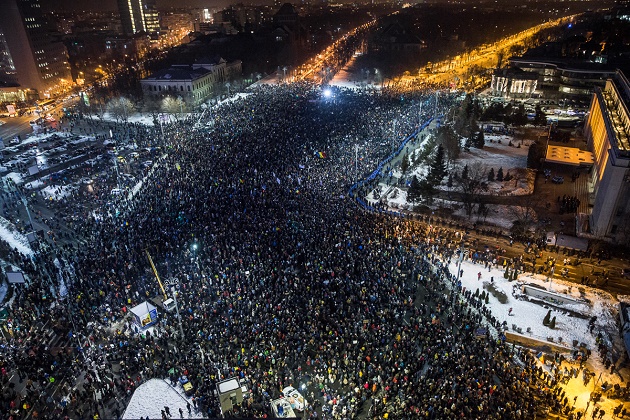 About 200,000 people protest in Bucharest, in front of the government headquarters. / I. Moldovan, Al Jazeera
About 200,000 people protest in Bucharest, in front of the government headquarters. / I. Moldovan, Al Jazeera
Large crowds have taken the streets in dozens of Romanian cities this week to say “no” to corruption.
On January 31, the government led by Prime Minister Sorin Grindeanu adopted an emergency decree that decriminalises the theft of public funds when the amount involved is less than 44,000 Euro, abuse of power, conflict of interest and work negligence.
Many thousands reacted on the streets that same night, in what are thought to be the largest protests in Romania in decades. “You did it at night, like thieves”, protestors chanted.
The President of Romania, Klaus Iohannis, expressed his concern by saying: “The rule of law has received a grave blow from the enemies of justice”. Countries like Germany, France, Netherlands, Belgium, USA and Canada have publicly expressed their disapproval.
Adrian Petrice, PhD in Political Sciences and a professing Christian, was one of the many that protested this week. He believes “Christians cannot be salt and light by being absent”.
Petrice shared his views with Evangelical Focus in the following interview.
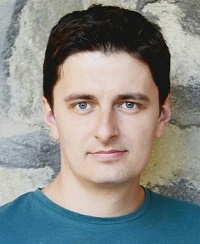 Adrian Petrice.
Adrian Petrice. Question. What are the main reasons for the protests that erupted this week?
Answer. As you might have seen in the news, Romania goes these days through its biggest protests since the 1989 revolution. Actually, the number of people protesting in the streets is bigger than what we had at the revolution that overthrew the communist regime then.
The public outrage was triggered by government controversial anti-corruption reforms, passed under the appearance of mere necessary changes to some provisions of the criminal code, aimed to avoid jamming the judicial system, ease prison overcrowding and bring the criminal code in line with recent constitutional court rulings. The new decree decriminalises some corruption offences (mainly abuse of public office) and sets a threshold of 44,000 euros financial damage for deeming an offence as criminal.
All these contentious measures came in the following context: in recent years Romania witnessed a major crack-down on political corruption. According to a statement made by DNA (The National Anticorruption Directorate) to Euronews, “1,250 people were put before the country’s justice system in 2015, including 16 MPs, five ministers, five senators and 97 mayor and deputy mayors.” High profile politicians and public officials were arrested and jailed over corruption crimes.
The Romanian people feel that the real stake of this decree is to ease the anti-corruption fight in Romania and to make more room for manoeuvre to corrupt officials. The outrage was sparked also by the way these measures were adopted. Romanians are angry because the decree was pushed through without a debate in Parliament. The people protesting in the streets (myself included) perceive these changes as a ‘u-turn’ on the country’s corruption reforms. Romania’s president Klaus Iohannis and members of parliamentary opposition accused the government of ignoring the rule of law, since these measures can encourage the abusive conduct of the public officials.
The government ignored so far all these warnings based on their recent electoral victory: the socialists (PSD-45,9%) and their satellite party (ALDE-5,64%) won the majority of seats in the Romanian Parliament based on populistic promises, mainly economic measures included in their electoral offer and pretend now that this victory gives them legitimacy to take whatever measures they consider necessary, as the people delegated them to govern the country in democratic and fair elections.
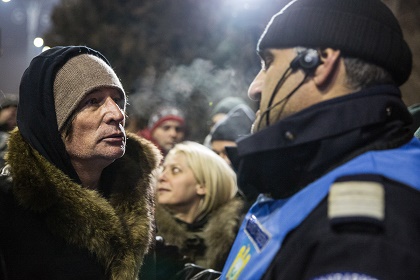 Thousands are joining the daily protests. / I. Moldovan
Thousands are joining the daily protests. / I. MoldovanThe latest legislative elections were indeed fair, also due to the previous technocratic government who took unprecedented measures to counter electoral fraud (of which the actual president of PSD is accused and under an ongoing trial). Due to people disappointment with politics, the turnover was low: only 39,49% of citizens with voting rights cast their vote in December 2016. Now, even people who voted for PSD are out in the streets protesting this decree, which was not included in their programme. Also, few PSD members and PSD officials holding positions in the government resigned over the recent decree.
The fact that the government ignored as of today all these unprecedented protests only fuel people’s outrage and I am pretty sure that the street protests will continue during the next days. It seems that either this decree will be reversed, and this government will fall, or many feel our country will be set back, as all the remarkable progress made in fighting corruption associated with politics will be undone.
Q. What do Christians generally think about the state of corruption in Romania?
A. Generally speaking, professing Christians in Romania condemn corruption and stand against political corruption, but they do it from a passive standpoint. They are not proactively fighting corruption in a consistent and intentional manner.
I would say, it does not represent a top priority, and you could easily see this from the lack of articulated proposals of measures to fight it coming from Christians, based on clear Christian assumptions and argued for in a way that harness the biblical perspective against corruption, which is rich and compelling.
What we see these days is that the civic conscience of professing Christians, and particularly evangelicals is stirred up by these outrageous measures and many are taking the streets to join the massive protests. This is a step forward, that goes beyond just praying on Sundays in churches for those in authority, according to 1 Timothy 2:1, 2. Hopefully more Christians will understand that under a democratic regime, citizen rights come with citizen duties, and that ”when injustice becomes law, resistance becomes duty”, to use a quote by Thomas Jefferson, that was widely used these days in Romania.
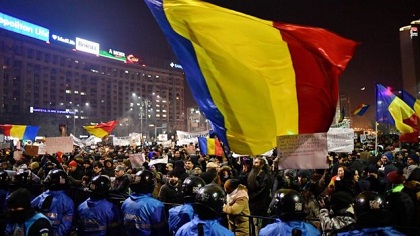 Romanian flags were shown in the protest against corruption. / BBC
Romanian flags were shown in the protest against corruption. / BBC
Q. Do you believe evangelical churches are outspoken about corruption and other moral issues in Romania?
A. As I already mentioned, churches in Romania are not known for being outspoken on issues that go beyond what I would call “single issue policy”, such as gay marriage, the right to life for unborn children, parental rights and religious freedoms.
These are considered moral issues and sometimes are addressed publicly, and for the rest, the tendency is to ignore them and to have the impression that we’ve done our fair share by praying and interceding “for all people - for kings and those in authority, that we may live peaceful and quiet lives in all godliness and holiness” (1 Tim 2:1-3). Based on these verses, an entire “theology of withdrawal” emerged in our country; I am talking especially about the evangelical culture here. This is what I would call an exclusive inward preoccupation, as if all we care is to be left alone and not be bothered by “the world”.
This is sad, because Christianity offers a moral compass and a coherent perspective that reaches beyond what I would call “the basics”, such as the right to life of the unborn. The right to life is obvious and cannot be overlooked, but the gospel has implications that should permeate our understanding of all human matters. Now, politics is a human activity par excellence, and should not be excluded.
I do not say that the church should aspire to the status of a political power and I am definitely for the separation of church and state, but to paraphrase one of our Lord Jesus sayings, these (fighting against political corruption) should be practiced without leaving the former undone (standing for the rights of the unborn).
Q. How can Christians have a real influence for good in the country?
A. Justice should never be neglected by Christian churches. And since the church itself is not (and should not be) a political institution, its members should be encouraged to get involved in the public arena in a way that is consistent with their Christian identity.
Even churches, as institutions may take a stand for values, in a non-partisan way, when values are disregarded in the public sphere. The good news is that the Orthodox Church, which is majoritarian in Romania, the Greek-Catholic Church and Roman-Catholic Church, through their press offices or prominent figures, issued statements that condemn “injustice done by those in authority”. There are isolated voices in the evangelical churches, pastors that also condemn the recent decree, but traditional churches reacted in a more articulated manner.
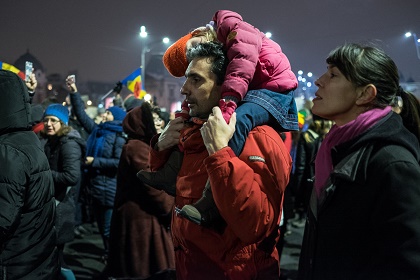 People demand the resignation of the whole government. I. Moldovan
People demand the resignation of the whole government. I. Moldovan
Q. Are there Christians in politics? How is their approach to corruption?
A. This is a somehow funny question, in a country in which an overwhelming majority of the population identify themselves as Christians (2011 census: over 92%, with only 0.2% declaring themselves to be atheists). Technically speaking, we could say that government corruption is practiced by self-identified Christians.
Now, when it comes to professing Christians, those who openly declare their faith and whose conducts are determined by their Christian identity and consistent with such an identity, I believe there are very few involved in mainstream politics. Those who are involved are not united in a platform or cross-party political group, and although there are a few evangelical Christians scattered in every political party in Romania, their voice is not distinct from the voice of the respective parties.
I don’t say this to judge or to condemn them, I really believe that more professing Christians should get involved in politics, regardless of the political parties they are in. There is a real need for more Christians to pursue a political career as a calling, not as to a job.
I really hope that professing Christians will have their civic conscience waken. The calling to a political career is not for everybody, but I believe that the calling to active, conscious citizenship is for every Christian.
Unfortunately, due to our communist past, the vast majority of evangelical Christians tend to avoid being involved in politics or public life, and still maintain an isolationist way of relating to the public arena. Many are still under the following logic: “we have to keep the faith, don’t mingle with worldly matters, and most and foremost, stay away from politics! It’s dirty and dangerous for a Christian who don’t want to compromise his faith!”
They take it as their civic duty to cast their vote and to pray for the country and authorities, but most of their civic engagement stops at fulfilling this minimal duty. General public prayers for authorities and our country, done every once in a while during religious services covers for most Christians in Romania what they understand as their duty towards “the city”.
I say this based on first hand experience. Since 2008, when I started to work on a project aimed at representing politically the evangelical Christians, articulating their political views and bring a practical Christian point of view in the political debates in the Romanian society, I heard a lot of criticism against Christians being proactively involved in politics, coming especially from within the evangelical community.
Together with an initiative group we raised the issue that we need a genuine Christian-democratic party in Romania, an articulated Christian voice in the political arena. In spite of what we believed it was clear evidence in favour of such a need, I heard a lot of nay sayers that not only dismissed such an initiative as non-feasible for practical reasons, but condemned it as dangerous and unbiblical.
I strongly believe that every legitimate human activity can be redeemed by the power of the gospel, and that we should have enough faith to include politics, in spite of being deemed as one of the most corrupt area in our society. I use to say pretty often that due to human frailty, because we, human beings are all corrupted and affected by sin, representative politics is an alternative to violence and that in any society, non-compromising compromises are better that an uncompromising, definitive and totalitarian solution.
We should not be control oriented, we should not crave power for the sake of it, and we should not have theocratic political ambitions. As Christians, we should be salt and light even in politics and manifest a godly influence. The minimal necessary condition to exercise such an influence is to be present. There is a more complicated discussion regarding other conditions, such as character, civility, respect for those who believe differently, but it is obvious that Christians cannot be salt and light by being absent.
ABOUT ADRIAN PETRICE
Adrian Petrice holds a PhD in Political Sciences. He graduated Economics (International Economic Relations) and Political Sciences and holds a Master Degree in Project Management. He is a PhD research associate at the Centre for Policy Analysis and the Institute of Global Studies, Babes-Bolyai University, Cluj-Napoca, the biggest university in Romania.
Adrian Petrice is one of the founding members of the Christian Democratic Union of Romania (UCDR), where he is currently General Secretary.

Las opiniones vertidas por nuestros colaboradores se realizan a nivel personal, pudiendo coincidir o no con la postura de la dirección de Protestante Digital.
Si quieres comentar o